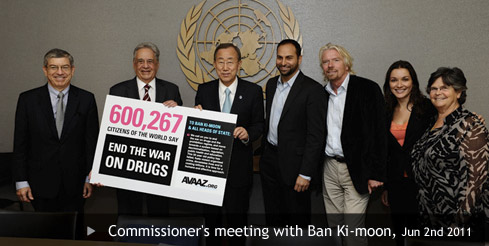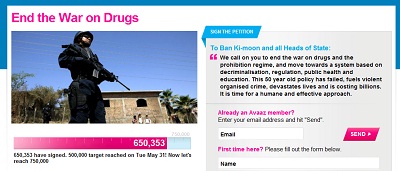Stopp krigen mot narkotika!

The Global Commission on Drug Policy er et utvalg sammensatt av en rekke høytstående politikere og tjenestemenn, blant annet tidligere president i Brasil, Fernando Henrique Cardoso, tidligere president i Colombia, Cesar Gaviria, FNs tidligere generalsekretær, tidligere EU høykommissær for felles utenriks-og sikkerhetspolitikk, Javier Solana, og UNAIDS direktør, Michel Kazatchkine. Norge er representert ved tidligere utenriksminister Thorvald Stoltenberg.
The Global Commission on Drug policy presenterer sine anbefalinger til FNs generalsekretær Ban Ki-moon i New York den 2. juni.
The Global Commision on Drug Policys anbefaling:
“Få slutt på kriminaliseringen, marginaliseringen og stigmatiseringen av mennesker som bruker narkotika, men ikke skader andre.”
“Politiske ledere og offentlige personer må ha mot til å si offentlig hva mange av de erkjenner privat, at bevisene på en overveldende måte demonstrerer at undertrykkende strategier ikke vil løse narkotikaproblemet og at krigen mot narkotika har ikke, og kan ikke bli vunnet.”
“Regjeringer må oppmuntres til å eksperimentere med modeller for legalisering av rusmidler for å undergrave organisert kriminalitet og trygge borgernes helse og sikkerhet. Denne anbefalingen gjelder spesielt cannabis, men vi oppfordrer også til andre eksperimenter med avkriminalisering og lovregulering som kan nå disse målene og inspirere andre til etterfølgelse.”
Arrangementet ledsages av en stor internasjonal kampanje som har som mål å samle 500 000 støtteerklæringer i underskriftskampanjen «End the war on drugs!»

To Ban Ki-moon and all Heads of State:
«We call on you to end the war on drugs and the prohibition regime, and move towards a system based on decriminalisation, regulation, public health and education. This 50 year old policy has failed, fuels violent organised crime, devastates lives and is costing billions. It is time for a humane and effective approach.
End the criminalization, marginalization and stigmatization of people who use drugs but who do no harm to others. Challenge rather than reinforce common misconceptions about drug markets, drug use and drug dependence. Encourage experimentation by governments with models of legal regulation of drugs to undermine the power of organized crime and safeguard the health and security of their citizens. This recommendation applies especially to cannabis, but we also encourage other experiments in decriminalization and legal regulation that can accomplish these objectives and provide models for others.
Offer health and treatment services to those in need. Ensure that a variety of treatment modalities are available, including not just methadone and buprenorphine treatment but also the heroin-assisted treatment programs that have proven successful in many European countries and Canada. Implement syringe access and other harm reduction measures that have proven effective in reducing transmission of HIV and other blood-borne infections as well as fatal overdoses. Respect the human rights of people who use drugs. Abolish abusive practices carried out in the name of treatment – such as forced detention, forced labor, and physical or psychological abuse – that contravene human rights standards and norms or that remove the right to self-determination.
Apply much the same principles and policies stated above to people involved in the lower ends of illegal drug markets, such as farmers, couriers and petty sellers. Many are themselves victims of violence and intimidation or are drug dependent. Arresting and incarcerating tens of millions of these people in recent decades has filled prisons and destroyed lives and families without reducing the availability of illicit drugs or the power of criminal organizations. There appears to be almost no limit to the number of people willing to engage in such activities to better their lives, provide for their families, or otherwise escape poverty. Drug control resources are better directed elsewhere.
Invest in activities that can both prevent young people from taking drugs in the first place and also prevent those who do use drugs from developing more serious problems. Eschew simplistic ‘just say no’ messages and ‘zero tolerance’ policies in favor of educational efforts grounded in credible information and prevention programs that focus on social skills and peer influences. The most successful prevention efforts may be those targeted at specific at-risk groups.
Focus repressive actions on violent criminal organizations, but do so in ways that undermine their power and reach while prioritizing the reduction of violence and intimidation. Law enforcement efforts should focus not on reducing drug markets per se but rather on reducing their harms to individuals, communities and national security.
Begin the transformation of the global drug prohibition regime. Replace drug policies and strategies driven by ideology and political convenience with fiscally responsible policies and strategies grounded in science, health, security and human rights – and adopt appropriate criteria for their evaluation. Review the scheduling of drugs that has resulted in obvious anomalies like the flawed categorization of cannabis, coca leaf and MDMA. Ensure that the international conventions are interpreted and/or revised to accommodate robust experimentation with harm reduction, decriminalization and legal regulatory policies.»
Signer oppropet!
(aug 2013: målet er oppjustert til 1 million underskrifter, det er fortsatt mulig å signere)
Se også:
Global Commission on Drug Policy
The Global Commission on Drug Policy
March 6, 2013
Latin America: Time for a Positive Agenda on Citizen Security, Drug Policies and Arms Control
«Subsequently, at the United Nations General Assembly in September 2012, President Santos of Colombia, President Calderon of Mexico and President Molina of Guatemala openly criticized the War on Drugs paradigm and requested the U.N. to begin a serious debate to explore alternatives.
A joint statement was published on October 1, 2012, calling on U.N. Member States to begin an assessment process of “the achievements and limitations of current drug policy, as well as in regards to the violence that the production, trafficking and the consumption of drugs generates throughout the world”.
The wave of drug policy reform in Latin America gained further strength and the global media headlines when Uruguay announced its intention to not just legally regulate marijuana, but to have the state produce and sell it. The issue is currently being discussed at Uruguay’s Congress. Expectations were also raised in Mexico with the election of president Peña Nieto that while reinforcing his commitment to fight organized crime, has declared that his priority will be to reduce the violence that affect Mexican people.»
Se også:
http://anitanyholt.no/samfunn/latin-amerika-krever-endring-av-fn-avtalen-for-a-regulere-markedet-og-stoppe-krigen-mot-narkotika
Herved signert (så ikke noe frist for det…) God helg! 🙂
«Avkriminalisering» forstås litt forskjellig i ulike land, men mest vesentlig at problemene med rusmidler ikke er noe for straffeapparatet. Sammen med skaderedusering står dette sentralt i kommisjonens rapport. Jeg vil si det er et heldig trekk at man overlater de konkrete tiltakene til hvert enkelt land. Lovlig cannabis med både lovlig salg og lovlig produksjon kan kombineres med lovlig tildeling (gratis eller ikke) til heroinbrukere vil til sammen rive svartebørsen ned. Problemet er stimulantene, først og fremst amfetamin. Man kan tenke seg lovlig salg, men under svært strenge regler. Uansett legger ikke kommisjonen noen begrensninger på hvordan politikken nasjonalt kan utformes, og slik bør det også være. Det kan bare føre til motreaksjoner om noen land føler at de blir presset. Det er mange slags forhold og tradisjoner å ta hensyn til.
Signert. 😉 Takk for tipset.
Tycker det e bra om dom gör det. Mindre krimenalitet skull jag tro…
Man kan jo lure på hvorfor vi ikke har hørt noe om dette på nyhetene, men Dagbladet har iallefall laget en artikkel om saken:
«En av hovedideene bak krigen mot narkotika var at trusselen om strenge fengselsstraffer og høye bøter for de som solgte eller brukte narkotika, ville virke avskrekkende på nye potensielle brukere. Utvalget har funnet at dette virket stikk i strid mot sin hensikt og at man i land med en strikt narkotikapolitikk finner flere narkomane og narkotikarelaterte problemer enn i de landene som har lavere strafferammer. De konkluderer også med at land som har gått langt i å avkriminalisere og senke straffene ikke har opplevd en økning i antallet narkomane, noe mange i utgangspunktet hadde fryktet. »
«Politiske ledere og offentlige personer må ha mot til å si offentlig hva mange av dem erkjenner privat, at bevisene på en overveldende måte demonstrerer at undertrykkende strategier ikke vil løse narkotikaproblemet og at krigen mot narkotika har ikke, og kan ikke bli vunnet.»
http://www.dagbladet.no/2011/06/02/nyheter/narkotika/kriminalitet/innenriks/utenriks/16767921
Tittelen på DB-artikkelen er feil, media har ikke satt seg veldig godt inn i saken, og bruker avkriminalisering og legalisering om hverandre
Avkriminalisering betyr at bruk blir tillatt, mens produksjon og salg fortsatt er forbudt. Det er et skritt i riktig retning, men løser ikke gjengkrig-problematikken.
VG har også en artikkel om saken,
«Thorvald Stoltenberg og Kofi Annan vil legalisere narkotika»:
http://www.vg.no/nyheter/utenriks/artikkel.php?artid=10094821
Og her fra NRK,
«FN-gruppen foreslår at regjeringer må eksperimentere med lovlig regulering av narkotika, særlig når det gjelder cannabis, i praksis hasj og marihuana»:
http://www.nrk.no/nyheter/verden/1.7658192